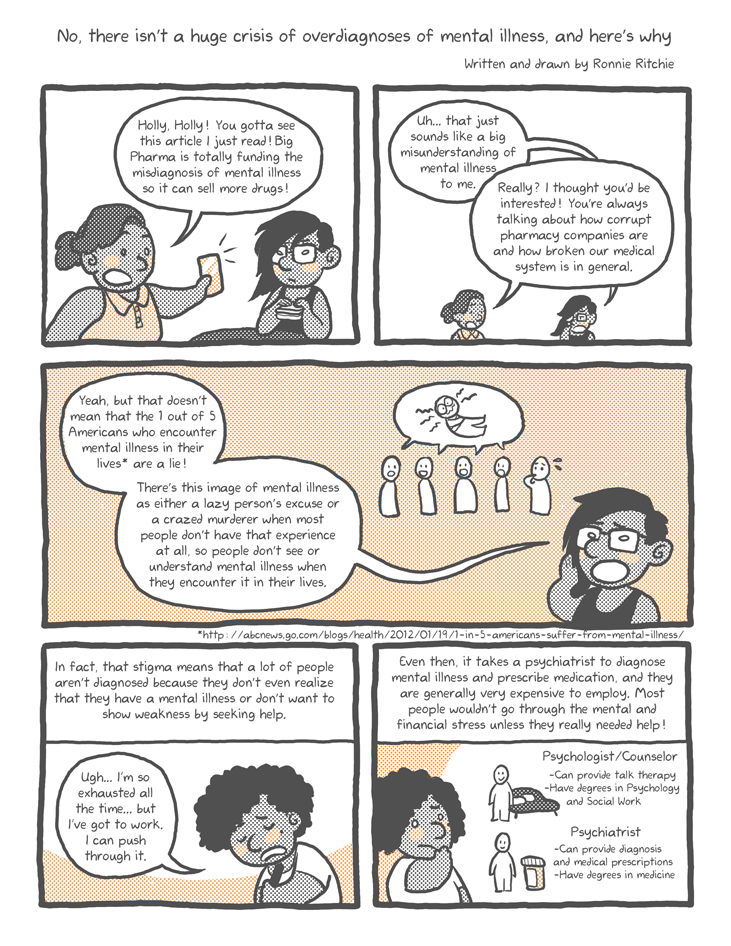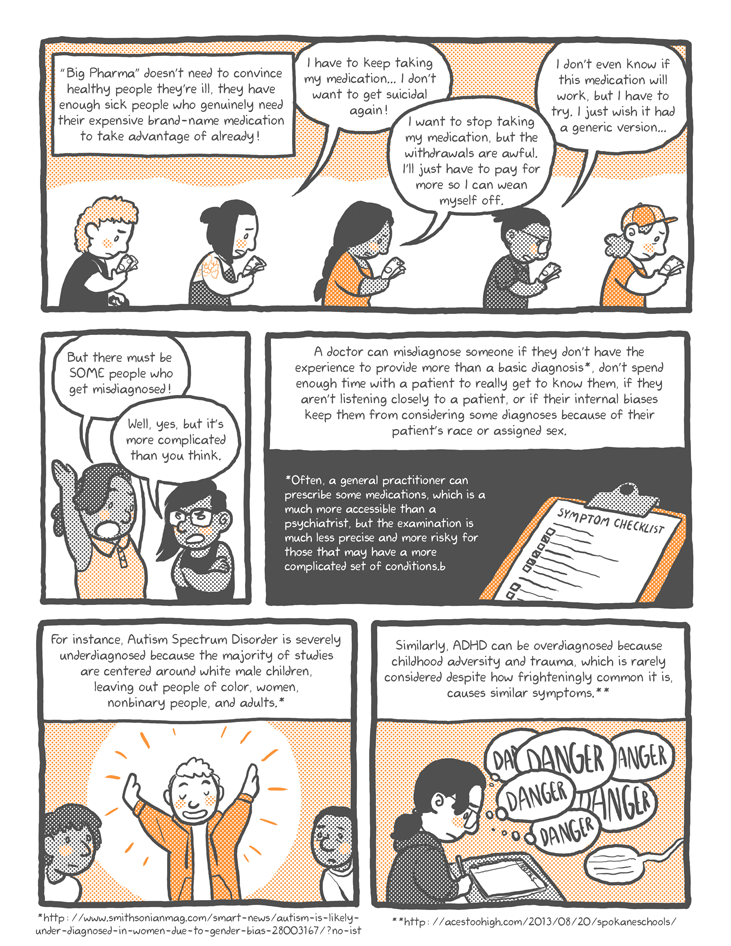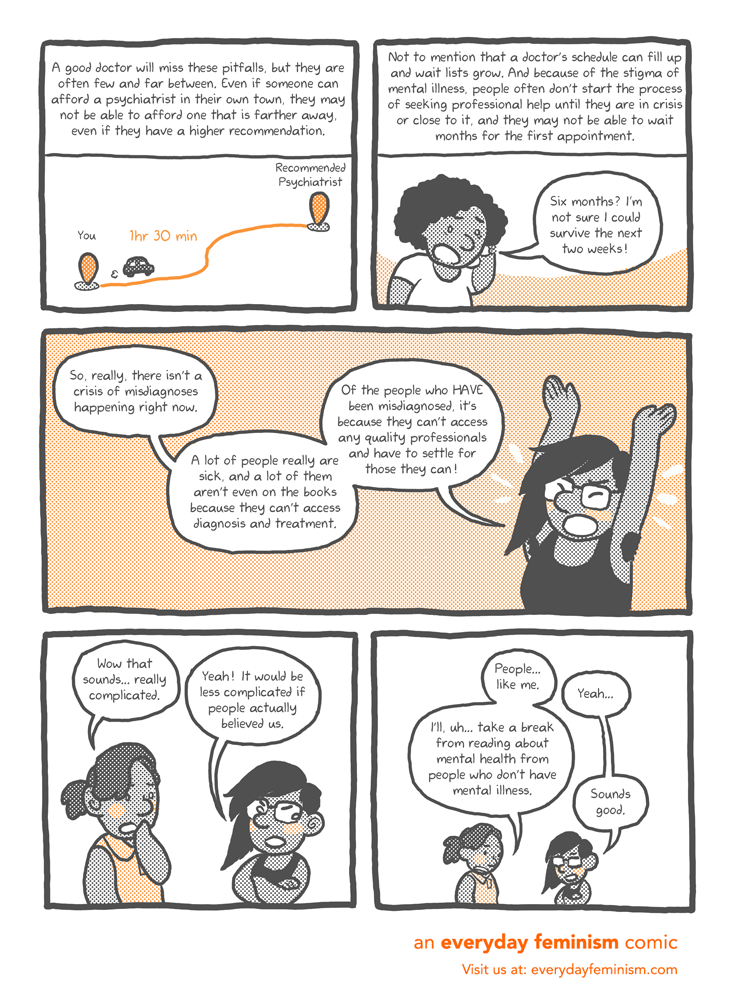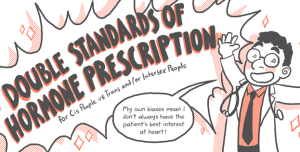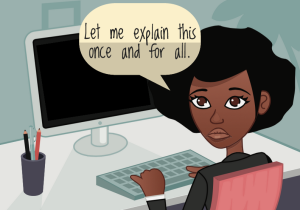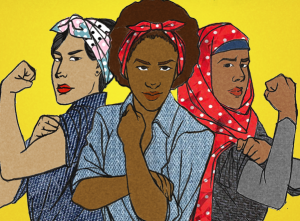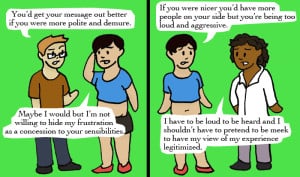Panel 1
(Holly’s friend hurries up to her, holding their phone out.)
Friend: Holly, Holly! You gotta see this article I just read! Big Pharma is totally funding the misdiagnosis of mental illness so it can sell more drugs!
Panel 2
(Holly holds a hand up to her mouth, while her friend looks on, confused.)
Holly: Uh… that just sounds like a big misunderstanding of mental illness to me.
Friend: Really? I thought you’d be interested! You’re always talking about how corrupt pharmacy companies are and how broken our medical system is in general.
Panel 3
(While Holly explains in the foreground, five people stand in the background. Four have a speech bubble with a person in a straight jacket inside, while the fifth looks on nervously.)
Holly: Yeah, but that doesn’t mean that the 1 out of 5 Americans who encounter mental illness in their lives is a lie! There’s this image of mental illness as either a lazy person’s excuse or a crazed murderer when most people don’t have that experience at all, so people don’t see or understand mental illness when they encounter it in their lives.
Panel 4
Holly: In fact, that stigma means that a lot of people aren’t diagnosed because they don’t even realize that they have a mental illness or don’t want to show weakness by seeking help.
(A person with curly hair sweeps the floor, sighing.)
Person: Ugh… I’m so exhausted all the time… but I’ve got to work. I can push through it.
Panel 5
Holly: Even then, it takes a psychiatrist to diagnose mental illness and prescribe medication, and they are generally very expensive to employ. Most people wouldn’t go through the mental and financial stress unless they really needed help!
(The person from the previous panel ponders a diagram of two people, one standing next to a couch, labeled “Psychologist/Counselor” and the other next to a prescription pill bottle, labeled “Psychiatrist”, with text.)
Text: Psychologist/Counselor: Can provide talk therapy. Have degrees in Psychology and Social Work. Psychiatrist: Can provide diagnosis and medical prescriptions. Have degrees in medicine.
Panel 6
(Image of many people looking sadly down at their hands, holding money.)
Holly: “Big Pharma” doesn’t need to convince healthy people they’re ill. They have enough sick people who genuinely need their expensive brand-name medication to take advantage of already!
Person 1: I have to keep taking my medication… I don’t want to get suicidal again!
Person 2: I want to stop taking my medication, but the withdrawals are awful. I’ll just have to pay for more so I can wean myself off.
Person 3: I don’t even know if this medication will work, but I have to try. I just wish it had a generic version…
Panel 7
(Holly’s friend makes a face, still not quite getting it. Holly looks frustrated.)
Friend: But there must be some people who get misdiagnosed!
Holly: Well, yes, but it’s more complicated than you think.
Panel 8
(A symptom checklist, clipped to a clipboard)
Holly: A doctor can misdiagnose someone if they don’t have the experience to provide more than a basic diagnosis*, don’t spend enough time with a patient to really get to know them, if they aren’t listening closely to a patient, or if their internal biases keep them from considering some diagnoses because of their patient’s race or assigned sex.
*Often, a general practitioner can prescribe some medications, which is a much more accessible than a psychiatrist, but the examination is much less precise and more risky for those that may have a more complicated set of conditions.
Panel 9
(A young White Autistic boy stands in the center, in the spotlight, while two older Autistic people peer in from the sides.)
Holly: For instance, Autism Spectrum Disorder is severely underdiagnosed because the majority of studies are centered around white male children, leaving out people of color, women, nonbinary people, and adults.
Panel 10
(A young student tries and fails to pay attention in class while their brain is bombarded with thoughts of “DANGER DANGER DANGER.” Their teacher’s lecture is an unintelligible mumble to them.)
Holly: Similarly, ADHD can be overdiagnosed because childhood adversity and trauma, which is rarely considered despite how frighteningly common it is, causes similar symptoms.
Panel 11
Holly: A good doctor will miss these pitfalls, but they are often few and far between. Even if someone can afford a psychiatrist in their own town, they may not be able to afford one that is farther away, even if they have a higher recommendation.
(A map displays two points, one labeled “You” and the other labeled “Recommended Psychiatrist.” A small car drives the distance between them, the length of which is labeled “1 hr, 30 min.”)
Panel 12
Holly: Not to mention that a doctor’s schedule can fill up and wait lists grow. And because of the stigma of mental illness, people often don’t start the process of seeking professional help until they are in crisis or close to it, and they may not be able to wait months for the first appointment.
(The person from earlier in the comic speaks on the phone, clearly distressed.)
Person: Six months?! I’m not sure I could survive the next two weeks!
Panel 13
(Holly throws up her arms.)
Holly: So, really, there isn’t a crisis of misdiagnoses happening right now. A lot of people really are sick, and a lot of them aren’t even on the books because they can’t access diagnosis and treatment. Of the people who have been misdiagnosed, it’s because they can’t access any quality professionals and have to settle for those they can!
Panel 14
(Holly makes a frustrated gesture while their friend looks on.)
Friend: Wow. That sounds… really complicated.
Holly: Yeah! It would be less complicated if people actually believed us.
Panel 15
(Holly’s friend, making the connection, blushes brightly. Holly looks relieved, but mostly tired.)
Friend: People… like me.
Holly: Yeah…
Friend: I’ll, uh… take a break from reading about mental health from people who don’t have mental illness.
Holly: Sounds good.
